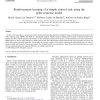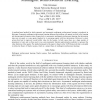340 search results - page 5 / 68 » Kernelized value function approximation for reinforcement le... |
152
Voted
ATAL
2005
Springer
15 years 8 months ago
2005
Springer
Reinforcement learning problems are commonly tackled with temporal difference methods, which use dynamic programming and statistical sampling to estimate the long-term value of ta...
124
Voted
IWANN
1999
Springer
15 years 7 months ago
1999
Springer
To avoid the curse of dimensionality, function approximators are used in reinforcement learning to learn value functions for individual states. In order to make better use of comp...
115
Voted
IJON
2006
15 years 2 months ago
2006
In this work, we propose a variation of a direct reinforcement learning algorithm, suitable for usage with spiking neurons based on the spike response model (SRM). The SRM is a bi...
174
click to vote
EWRL
2008
15 years 4 months ago
2008
A wide variety of function approximation schemes have been applied to reinforcement learning. However, Bayesian filtering approaches, which have been shown efficient in other field...
150
Voted
IAT
2003
IEEE
15 years 8 months ago
2003
IEEE
A gradient-based method for both symmetric and asymmetric multiagent reinforcement learning is introduced in this paper. Symmetric multiagent reinforcement learning addresses the ...


